- Home
- Lord Dunsany
The Gods of Pegana Page 3
The Gods of Pegana Read online
Page 3
Therefore the Worlds go on, and the rivers run to the sea, and Lifeariseth and flieth even in all the Worlds, and the gods of Peganado the work of the gods--and all for Dorozhand. But when the end ofDorozhand hath been achieved there will be need no longer of Life uponthe Worlds, nor any more a game for the small gods to play. Then willKib tiptoe gently across Pegana to the resting-place in Highest Peganaof MANA-YOOD-SUSHAI, and touching reverently his hand, the hand thatwrought the gods, say: "MANA-YOOD-SUSHAI, thou hast rested long."
And MANA-YOOD-SUSHAI shall say: "Not so; for I have rested for butfifty aeons of the gods, each of them scarce more than ten millionmortal years of the Worlds that ye have made."
And then shall the gods be afraid when they find that MANA knoweththat they have made Worlds while he rested. And they shall answer:"Nay; but the Worlds came all of themselves."
Then MANA-YOOD-SUSHAI, as one who would have done with an irksomematter, will lightly wave his hand--the hand that wrought thegods--and there shall be gods no more.
When there shall be three moons towards the north above the Starof the Abiding, three moons that neither wax nor wane but regardtowards the North.
Or when the comet ceaseth from his seeking and stands still, not anylonger moving among the Worlds but tarrying as one who rests afterthe end of search, then shall arise from resting, because it is THEEND, the Greater One, who rested of old time, even MANA-YOOD-SUSHAI.
Then shall the Times that were be Times no more; and it may bethat the old, dead days shall return from beyond the Rim, and wewho have wept for them shall see those days again, as one who,returning from long travel to his home, comes suddenly on dear,remembered things.
For none shall know of MANA who hath rested for so long, whetherhe be a harsh or merciful god. It may be that he shall have mercy,and that these things shall be.
THE EYE IN THE WASTE
There lie seven deserts beyond Bodrahan, which is the city of thecaravans' end. None goeth beyond. In the first desert lie thetracks of mighty travellers outward from Bodrahan, and somereturning. And in the second lie only outward tracks, and nonereturn.
The third is a desert untrodden by the feet of men.
The fourth is the desert of sand, and the fifth is the desert ofdust, and the sixth is the desert of stones, and the seventh isthe Desert of Deserts.
In the midst of the last of the deserts that lie beyond Bodrahan,in the centre of the Desert of Deserts, standeth the image thathath been hewn of old out of the living hill whose name isRanorada--the eye in the waste.
About the base of Ranorada is carved in mystic letters that arevaster than the beds of streams these words:
To the god who knows.
Now, beyond the second desert are no tracks, and there is no waterin all the seven deserts that lie beyond Bodrahan. Therefore cameno man thither to hew that statue from the living hills, andRanorada was wrought by the hands of gods. Men tell in Bodrahan,where the caravans end and all the drivers of the camels rest, howonce the gods hewed Ranorada from the living hill, hammering allnight long beyond the deserts. Moreover, they say that Ranorada iscarved in the likeness of the god Hoodrazai, who hath found thesecret of MANA-YOOD-SUSHAI, and knoweth the wherefore of the makingof the gods.
They say that Hoodrazai stands all alone in Pegana and speaks tonone because he knows what is hidden from the gods.
Therefore the gods have made his image in a lonely land as one whothinks and is silent--the eye in the waste.
They say that Hoodrazai had heard the murmers of MANA-YOOD-SUSHAIas he muttered to himself, and gleaned the meaning, and knew; andthat he was the god of mirth and of abundant joy, but became fromthe moment of his knowing a mirthless god, even as his image,which regards the deserts beyond the track of man.
But the camel drivers, as they sit and listen to the tales of theold men in the market-place of Bodrahan, at evening, while thecamels rest, say:
"If Hoodrazai is so very wise and yet is sad, let us drink wine,and banish wisdom to the wastes that lie beyond Bodrahan."Therefore is there feasting and laughter all night long in thecity where the caravans end.
All this the camel drivers tell when the caravans come in fromBodrahan; but who shall credit tales that camel drivers have heardfrom aged men in so remote a city?
OF THE THING THAT IS NEITHER GOD NOR BEAST
Seeing that wisdom is not in cities nor happiness in wisdom, andbecause Yadin the prophet was doomed by the gods ere he was bornto go in search of wisdom, he followed the caravans to Bodrahan.There in the evening, where the camels rest, when the wind of theday ebbs out into the desert sighing amid the palms its lastfarewells and leaving the caravans still, he sent his prayer withthe wind to drift into the desert calling to Hoodrazai.
And down the wind his prayer went calling: "Why do the godsendure, and play their game with men? Why doth not Skarl forsakehis drumming, and MANA cease to rest?" and the echo of sevendeserts answered: "Who knows? Who knows?"
But out in the waste, beyond the seven deserts where Ranoradalooms enormous in the dusk, at evening his prayer was heard; andfrom the rim of the waste whither had gone his prayer, came threeflamingoes flying, and their voices said: "Going South, GoingSouth" at every stroke of their wings.
But as they passed by the prophet they seemed so cool and free andthe desert so blinding and hot that he stretched up his armstowards them. Then it seemed happy to fly and pleasant to followbehind great white wings, and he was with the three flamingoes upin the cool above the desert, and their voices cried before him:"Going South, Going South," and the desert below him mumbled: "Whoknows? Who knows?"
Sometimes the earth stretched up towards them with peaks ofmountains, sometimes it fell away in steep ravines, blue riverssang to them as they passed above them, or very faintly came thesong of breezes in lone orchards, and far away the sea sang mightydirges of old forsaken isles. But it seemed that in all the worldthere was nothing only to be going South.
It seemed that somewhere the South was calling to her own, andthat they were going South.
But when the prophet saw that they had passed above the edge ofEarth, and that far away to the North of them lay the Moon, heperceived that he was following no mortal birds but some strangemessengers of Hoodrazai whose nest had lain in one of Pegana'svales below the mountains whereon sit the gods.
Still they went South, passing by all the Worlds and leaving themto the North, till only Araxes, Zadres, and Hyraglion lay still tothe South of them, where great Ingazi seemed only a point oflight, and Yo and Mindo could be seen no more.
Still they went South till they passed below the South and came tothe Rim of the Worlds.
There there is neither South nor East nor West, but only North andBeyond; there is only North of it where lie the Worlds, and Beyondit where lies the Silence, and the Rim is a mass of rocks thatwere never used by the gods when They made the Worlds, and on itsat Trogool. Trogool is the Thing that is neither god nor beast,who neither howls nor breathes, only _It_ turns over theleaves of a great book, black and white, black and white for everuntil THE END.
And all that is to be is written in the book is also all that was.
When _It_ turneth a black page it is night, and when_It_ turneth a white page it is day.
Because it is written that there are gods--there are the gods.
Also there is writing about thee and me until the page where ournames no more are written.
Then as the prophet watched _It_, Trogool turned a page--ablack one, and night was over, and day shone on the Worlds.
Trogool is the Thing that men in many countries have called bymany names, _It_ is the Thing that sits behind the gods,whose book is the Scheme of Things.
But when Yadin saw that old remembered days were hidden away withthe part that _It_ had turned, and knew that upon one whosename is writ no more the last page had turned for ever a thousandpages back. Then did he utter his prayer in the fact of Trogoolwho only turns the pages and never answers prayer. He prayed inthe face of Trogool: "
Only turn back thy pages to the name of onewhich is writ no more, and far away upon a place named Earth shallrise the prayers of a little people that acclaim the name ofTrogool, for there is indeed far off a place called Earth wheremen shall pray to Trogool."
Then spake Trogool who turns the pages and never answers prayer,and his voice was like the murmurs of the waste at night whenechoes have been lost: "Though the whirlwind of the South shouldtug with his claws at a page that hath been turned yet shall henot be able to ever turn it back."
Then because of words in the book that said that it should be so,Yadin found himself lying in the desert where one gave him water,and afterwards carried him on a camel into Bodrahan.
There some said that he had but dreamed when thirst seized himwhile he wandered among the rocks in the desert. But certain agedmen of Bodrahan say that indeed there sitteth somewhere a Thingthat is called Trogool, that is neither god nor beast, thatturneth the leaves of a book, black and white, black and white,until he come to the words: _Mai Doon Izahn_, which means TheEnd For Ever, and book and gods and worlds shall be no more.
YONATH THE PROPHET
Yonath was the first among prophets who uttered unto men.
These are the words of Yonath, the first among all prophets:
There be gods upon Pegana.
Upon a night I slept. And in my sleep Pegana came very near. AndPegana was full of gods.
I saw the gods beside me as one might see wonted things.
Only I saw not MANA-YOOD-SUSHAI.
And in that hour, in the hour of my sleep, I knew.
And the end and the beginning of my knowing, and all of my knowingthat there was, was this--that Man Knoweth Not.
Seek thou to find at night the utter edge of the darkness, or seekto find the birthplace of the rainbow where he leapeth upward fromthe hills, only seek not concerning the wherefore of the making ofthe gods.
The gods have set a brightness upon the farther side of the Thingsto Come that they may appear more felititous to men than theThings that Are.
To the gods the Things to Come are but as the Things that Are, andnothing altereth in Pegana.
The gods, although not merciful, are not ferocious gods. They arethe destroyers of the Days that Were, but they set a glory aboutthe Days to Be.
Man must endure the Days that Are, but the gods have left him hisignorance as a solace.
Seek not to know. Thy seeking will weary thee, and thou wiltreturn much worn, to rest at last about the place from whence thousettest out upon thy seeking.
Seek not to know. Even I, Yonath, the oldest prophet, burdenedwith the wisdom of great years, and worn with seeking, know onlythat man knoweth not.
Once I set out seeking to know all things. Now I know one thingonly, and soon the Years will carry me away.
The path of my seeking, that leadeth to seeking again, must betrodden by very many more, when Yonath is no longer even Yonath.
Set not thy foot upon that path.
Seek not to know.
These be the Words of Yonath.
YUG THE PROPHET
When the Years had carries away Yonath, and Yonath was dead,there was no longer a prophet among men.
And still men sought to know.
Therefore they said unto Yug: "Be thou our prophet, and know allthings, and tell us concerning the wherefore of It All."
And Yug said: "I know all things." And men were pleased.
And Yug said of the Beginning that it was in Yug's own garden, andof the End that it was in the sight of Yug.
And men forgot Yug.
One day Yug saw Mung behind the hills making the sign of Mung. AndYug was Yug no more.
ALHIRETH-HOTEP THE PROPHET
When Yug was Yug no more men said unto Alhireth-Hotep: "Be thouour prophet, and be as wise as Yug."
And Alhireth-Hotep said: "I am as wise as Yug." And men were veryglad.
And Alhireth-Hotep said of Life and Death: "These be the affairsof Alhireth-Hotep." And men brought gifts to him.
One day Alhireth-Hotep wrote in a book: "Alhireth-Hotep knowethAll Things, for he hath spoken with Mung."
And Mung stepped from behind him, making the sign of Mung, saying:"Knowest thou All Things, then, Alhireth-Hotep?" And Alhireth-Hotepbecame among the Things that Were.
KABOK THE PROPHET
When Alhireth-Hotep was among the Things that Were, and still mensought to know, they said unto Kabok: "Be thou as wise as wasAlhireth-Hotep."
And Kabok grew wise in his own sight and in the sight of men.
And Kabok said: "Mung maketh his signs against men or withholdethit by the advice of Kabok."
And he said unto one: "Thou hast sinned against Kabok, thereforewill Mung make the sign of Mung against thee." And to another:"Thou has brought Kabok gifts, therefore shall Mung forbear tomake against thee the sign of Mung."
One night as Kabok fattened upon the gifts that men had broughthim he heard the tread of Mung treading in the garden of Kabokabout his house at night.
And because the night was very still it seemed most evil to Kabokthat Mung should be treading in his garden, without the advice ofKabok, about his house at night.
And Kabok, who knew All Things, grew afraid, for the treading wasvery loud and the night still, and he knew not what lay behind theback of Mung, which none had ever seen.
But when the morning grew to brightness, and there was light uponthe Worlds, and Mung trod no longer in the garden, Kabok forgothis fears, and said: "Perhaps it was but a herd of cattle thatstampeded in the garden of Kabok."
And Kabok went about his business, which was that of knowing AllThings, and telling All Things unto men, and making light of Mung.
But that night Mung trod again in the garden of Kabok, about hishouse at night, and stood before the window of the house like ashadow standing erect, so that Kabok knew indeed that it was Mung.
And a great fear fell upon the throat of Kabok, so that his speechwas hoarse; and he cried out: "Thou art Mung!"
And Mung slightly inclined his head, and went on to tread in thegarden of Kabok, about his house at night.
And Kabok lay and listened with horror at his heart.
But when the second morning grew to brightness, and there waslight upon the Worlds, Mung went from treading in the garden ofKabok; and for a little while Kabok hoped, but looked with greatdread for the coming of the third night.
And when the third night was come, and the bat had gone to hishome, and the wind had sank, the night was very still.
And Kabok lay and listened, to whom the wings of the night flewvery slow.
But, ere night met the morning upon the highway between Pegana andthe Worlds, there came the tread of Mung in the garden of Kaboktowards Kabok's door.
And Kabok fled out of his house as flees a hunted beast and flunghimself before Mung.
And Mung made the sign of Mung, pointing towards THE END.
And the fears of Kabok had rest from troubling Kabok any more, forthey and he were among accomplished things.
OF THE CALAMITY THAT BEFEL YUN-ILARA BY THE SEA, AND OF THEBUILDING OF THE TOWER OF THE ENDING OF DAYS
When Kabok and his fears had rest the people sought a prophet whoshould have no fear of Mung, whose hand was against the prophets.
And at last they found Yun-Ilara, who tended sheep and had no fearof Mung, and the people brought him to the town that he might betheir prophet.
And Yun-Ilara builded a tower towards the sea that looked upon thesetting of the Sun. And he called it the Tower of the Ending ofDays.
And about the ending of the day would Yun-Ilara go up to histower's top and look towards the setting of the Sun to cry hiscurses against Mung, crying: "O Mung! whose hand is against theSun, whom men abhor but worship because they fear thee, here standsand speaks a man who fears thee not. Assassin lord of murder anddark things, abhorrent, merciless, make thou the sign of Mungagainst me when thou wilt, but until silence settles upon my lips,because of the sign of Mung, I will curse Mung to his
face." Andthe people in the street below would gaze up with wonder towardsYun-Ilara, who had no fear of Mung, and brought him gifts; only intheir homes after the falling of the night would they pray againwith reverence to Mung. But Mung said: "Shall a man curse a god?"
And still Mung came not nigh to Yun-Ilara as he cried his cursesagainst Mung from his tower towards the sea.
And Sish throughout the Worlds hurled Time away, and slew theHours that had served him well, and called up more out of thetimeless waste that lieth beyond the Worlds, and drave them forthto assail all things. And Sish cast a whiteness over the hairs ofYun-Ilara, and ivy about his tower, and weariness over his limbs,for Mung passed by him still.
And when Sish became a god less durable to Yun-Ilara than everMung hath been he ceased at last to cry from his tower's top hiscurses against Mung whenever the sun went down, till there camethe day when weariness of the gift of Kib fell heavily uponYun-Ilara.
Then from the tower of the Ending of Days did Yun-Ilara cry outthus to Mung, crying: "O Mung! O loveliest of the gods! O Mung,most dearly to be desired! thy gift of Death is the heritage ofMan, with ease and rest and silence and returning to the Earth.Kib giveth but toil and trouble; and Sish, he sendeth regrets witheach of his hours wherewith he assails the World. Yoharneth-Lahaicometh nigh no more. I can no longer be glad with Limpang-Tung.When the other gods forsake him a man hath only Mung."
But Mung said: "Shall a man curse a god?"

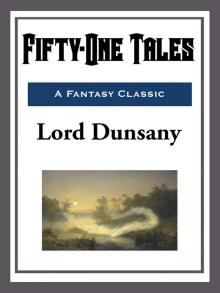 Fifty-One Tales
Fifty-One Tales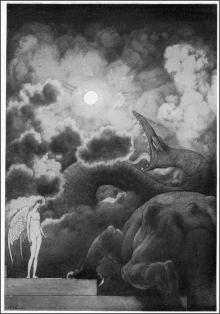 Time and the Gods
Time and the Gods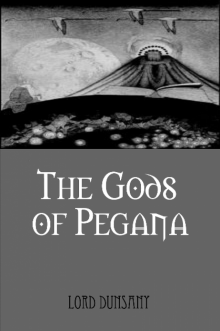 The Gods of Pegana
The Gods of Pegana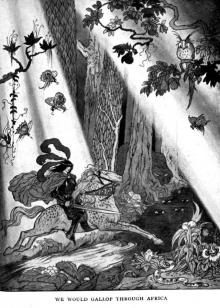 A Dreamer's Tales
A Dreamer's Tales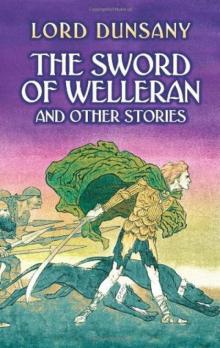 The Sword of Welleran and Other Stories
The Sword of Welleran and Other Stories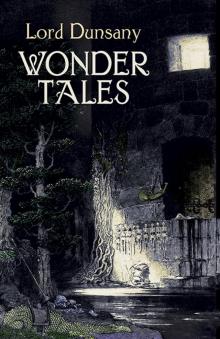 Tales of Wonder
Tales of Wonder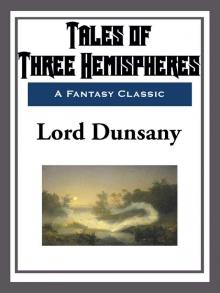 Tales of Three Hemispheres
Tales of Three Hemispheres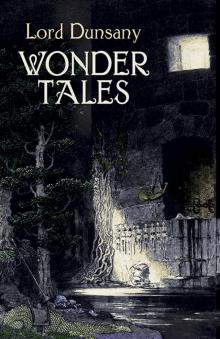 The Book of Wonder
The Book of Wonder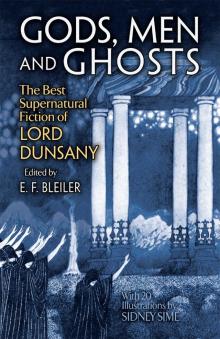 Gods, Men and Ghosts
Gods, Men and Ghosts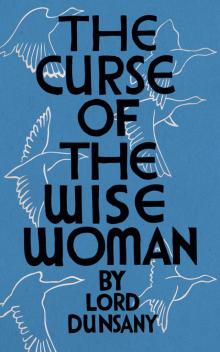 The Curse of the Wise Woman
The Curse of the Wise Woman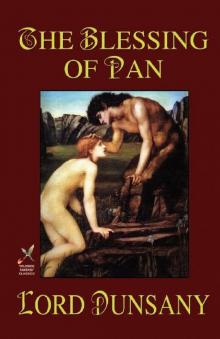 The Blessing of Pan
The Blessing of Pan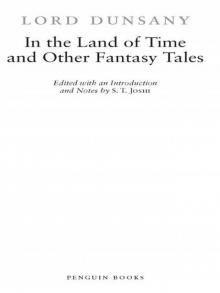 In the Land of Time
In the Land of Time